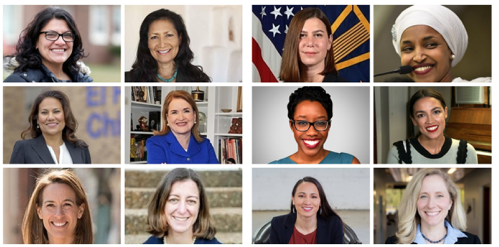
There were a lot of firsts on Tuesday. A record number of women ran and won in elections across the United States. According to the New York Times, 250 women were on the ballot. Of those, 117 women won seats in Congress, governorships, and state legislatures (100 Democrats and 17 Republicans). Of the 435 seats in the U.S. House of Representatives, women will occupy 100 (up from 84). Come January, the U.S. Senate will have 23 women.

While that’s something to behold, it’s still woefully behind many places in the world. To start, 76 countries have had a female as head of state or government, including Bangladesh, Pakistan, and Turkey — Muslim majority countries — but not the United States (as we so painfully know).
Receive the FP Interrupted Newsletter each Friday morning. Sign up by clicking below.
Currently, there are 25 female heads of state or government. That number will likely go down one as Germany’s Angela Merkel steps down as the head of her party, the Christian Democratic Union (CDU), and will likely step down as chancellor.
At the legislative level, there are 30 countries that have gender quotas, that require a certain percentage of female representation in legislative bodies. U.S. World News reports: “The world average today is 23.8 percent of women (in parliaments) worldwide,” says Kareen Jabre, director of the division of programs at the Switzerland-based Inter-Parliamentary Union.
Rwanda has the most women in parliament, followed by Cuba, Bolivia, Grenada, and Namibia. The United States ranks 101 out of 193 countries; it ranks behind Saudi Arabia (yes, we did a double take on that as well 👀).
It goes without saying, but somehow we have to keep screaming it everywhere, inclusion matters. You can’t have a successful society when half of a population is left on the sidelines. You most certainly won’t have progress. If America truly is the “innovation capital of the world,” it needs to get busy to get to gender equity.
Our sleeves are rolled up. We’re ready. Let’s do this.
Mid-Terms
- Democrats gained control of the U.S. House of Representatives in this week’s election and have an opportunity to influence the Trump administration’s foreign policy. Caroline Tess and Brian McKeon provide a playbook for Congress to rise to the occasion. (Foreign Affairs)
- Asli Aydintasbas on why the Democratic victory in the House is a big deal for the rest of the world. (Washington Post)
- America’s descent into total oligarchy has been stopped – for now says Heather Cox Richardson. (Guardian)
The Caravan!
Isn’t it amazing how the caravan has just disappeared from the news? Just days before the election, it was the biggest national security threat to the United States. Not a peep about it since. Our FPI Fellows and others are following it.
- See the Central American migrants arriving in Mexico City after weeks on the road as part of a caravan with FPI Fellow Alice Driver. (Time)
- Trump claims that if you search the caravan, you’ll find MS-13, the notorious Central American gang. FPI Fellow Molly O’Toole notes that that gang problem is American-made, and asks: Can Megachurches Save El Salvador? (New Republic)
- Following U.S. Attorney General Jeff Session’s resignation, Ana Campoy reviews his legacy as an ardent advocate of the Trump administration’s anti-immigration agenda. (Quartz)
- Lina Srivastava has a suggestion on what we can do to fight the Trump Administration’s xenophobia. (Time)
Read the rest of FP Interrupted here.
This was republished with the permission of FP Interrupted.


